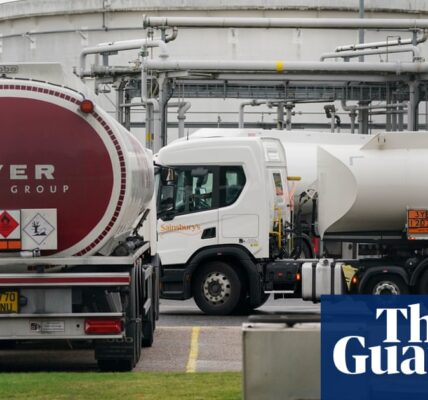A pharmacist in Jordan’s ‘Gaza camp’ is selling hydroponically grown onions for Palestinians.
I
Abu Saleh, a chemist, has become well-known for his exceptional onion-growing abilities. At the age of 23, he is currently providing for his family of eight by managing his own hydroponic greenhouse in a refugee camp located in northern Jordan. This opportunity arose after struggling to secure employment following his graduation.
Abu Saleh shared, “I constantly receive comments about being the pharmacist who sells onions. However, I don’t let it affect me as it is just a job.”
Abu Saleh cultivates his crops hydroponically, using water instead of soil. Within his greenhouse, the atmosphere is moist as the nutrient-rich water flows through rows of red lettuce, strawberries, and thyme before cycling back to the irrigation tank.
Abu Saleh, a resident of Jerash, was faced with limited opportunities in the most impoverished of Jordan’s 10 UN-registered camps for Palestinian refugees.
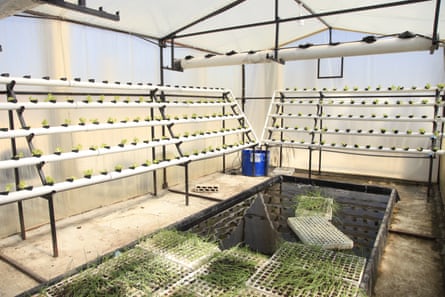
“I grow approximately 70kg of onions and 20kg of red lettuce every 40 days,” he explains while strolling through his well-organized rooftop greenhouse measuring 32 square meters. The profit from each harvest, which amounts to about £166, is sufficient to sustain his family.
The area of Jerash camp is commonly referred to as “Gaza camp” in the local community. It is a residence for approximately 30,000 Palestinians who originate from Gaza but migrated to Jordan following the conflict with Israel in 1967.
The majority of the estimated 2.2 million Palestinian refugees residing in Jordan have been granted citizenship and are entitled to the same privileges as other citizens. However, those who arrived in Gaza in 1967 and their descendants continue to face uncertainty. Without official identification numbers, they are often unable to secure employment, own land, or receive government assistance.
Abu Saleh was one of the first to benefit from Senara, a hydroponic farming business founded in 2020 by Mohammad Syam. Like Abu Saleh, Syam also lived in the Jerash refugee camp and graduated with a nursing degree in 2009. However, due to not having a Jordanian ID, both men faced challenges in finding employment. Syam also experienced financial struggles and familial obligations after his father passed away, adding to his difficulties.
The concept for his company, Senara, was originally suggested by a fellow resident of the Jerash camp, Abu Abdullah. He served as the inspiration for Syam as he witnessed Abdullah successfully growing his own roof-top produce.
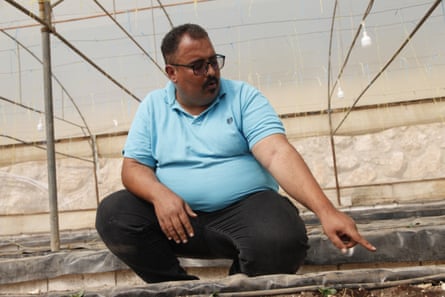
The 35-year-old father of two explains that he spent countless hours watching YouTube videos about hydroponics. He also applied for grants for a year before finally receiving funding from Unicef and Oxfam to start his company.
As of 2022, Senara has provided training for 49 individuals on managing hydroponic gardens and 34 individuals on constructing the systems. Currently, there are 164 rooftop greenhouses in operation, primarily located in densely populated refugee camps, but some can also be found in regular neighborhoods.
A major benefit of hydroponic farming is its significantly lower water consumption compared to traditional agriculture methods.
According to the Ministry of Water and Irrigation spokesperson Omar Salameh, in Jordan, an individual’s yearly allocation of water is only 80 cubic metres, which falls far below the UN’s definition of water scarcity (1,000 cubic metres per person per year) and is considered “absolute scarcity” (below 500 cubic metres).
According to Salameh, Jordanians have limited access to water and must adhere to a strict schedule, typically only once a week. In rural areas, this schedule may be extended to every two weeks.
Jordan’s food security is at risk due to drought, increasing temperatures, and rapid evaporation causing once fertile land to become desert.
Jordan’s dams have been significantly drained due to the minimal amount of rainfall last year, and the rate at which springs are drying up is cause for concern. In the past few years, rainfall has only been about half of the usual amount.
after newsletter promotion
In the meantime, the population of the small country in the Middle East has greatly increased, putting even more pressure on already limited resources. In 2010, the population was 7.2 million and now it is approximately 11 million. Jordan currently hosts at least one million refugees from Syria.
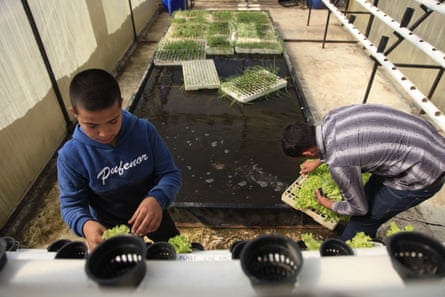
According to agricultural consultant Ahmed Mayyas, as extreme droughts continue to cause a significant decrease in crop yields, farmers are choosing to leave their fields at a higher rate. However, using hydroponic farming methods significantly reduces the need for irrigation and lowers associated costs.
Salim Abu Obeid, who is 21 years old, was previously denied employment due to his lack of official status. However, in 2021, he joined Syam and now oversees two plastic greenhouses where Senara showcases its hydroponic technology and experiments with various crops.
Every morning, he wakes up early to monitor the water levels and applies fertilizers to his rows of onions, lettuce, broccoli, strawberries, and thyme.
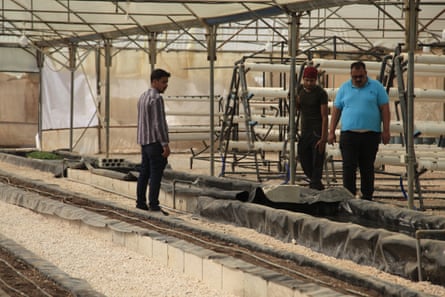
Display the image in full-screen mode.
Crop rotation is unnecessary as the same plant can be grown consistently without a decrease in yield. According to Abu Obeid, who manages approximately 1,400 sq metres of greenhouses, “With hydroponics, I only need to remove one seedling and replace it with another.”
Hydroponics has a downside, as growers claim, due to the initial expense – many parts must be brought in from other countries. The Ministry of Water and Irrigation reports that setting up a hydroponic system for growing cucumbers can run up to 3,000 Jordanian dinars (£3,500), a significant amount for farmers. This is one of the reasons why hydroponics has not been widely embraced.
However, the advantages are significant. Not only does hydroponic farming use a fraction of the water compared to traditional agriculture, but it also takes up less physical space due to its vertical row configuration, making it ideal for crowded refugee camps. Additionally, it provides a valuable resource for refugees in Jordan: financial self-sufficiency.
Syam emphasizes the significance of depending on ourselves through obtaining our own employment and cultivating our own crops.
This piece was written in partnership with Egab.
Source: theguardian.com

